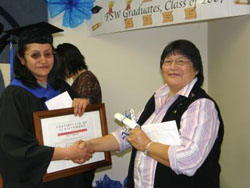Breast Cancer Awareness Online Workshops and Support Group
By Rick Garrick Dec. 2007
 Phyllis Chowaniec wants to use the access to broadband now available in remote and isolated First Nation communities to provide Aboriginal women fighting breast cancer with the support and assistance that people in cities take for granted.
Phyllis Chowaniec wants to use the access to broadband now available in remote and isolated First Nation communities to provide Aboriginal women fighting breast cancer with the support and assistance that people in cities take for granted.
A breast cancer survivor, she is looking to share her story with others from across the north through the creation of an online breast cancer support group. "It will help to support our people who have cancer and need to go out for treatment," says Chowaniec, a registered practical nurse who grew up in Bearskin Lake First Nation and is now Keewaytinook Okimakanak (KO) Health's long term care nurse. "I was hoping to help them by sharing my story. So they don't go out there (to the regional health centres) and expect the worst."
Chowaniec has already shared her story online with some Elders from northern Ontario's fly-in First Nation communities through KO's Breast Cancer Awareness Online Workshops and Support Group project, which provided three online videoconference sessions in February, March and July 2007 and looks to provide more sessions in 2008.
While the original goal of the workshops was to provide current information about breast cancer to health care professionals, local champions and community members, the participants, lead by Chowaniec, quickly recognized that IP video conferencing could be used to do more than provide information; it could be used to provide peer to peer support between breast cancer survivors and those living with the disease.
"This is just one example of what happens when communities have the right tools in their hands," says Brian Walmark, director of the Keewaytinook Okimakanak Research Institute (KORI). "Without adequate bandwidth, the communities would not have IP video conferencing and without video conferencing, these women living with breast cancer would be isolated and alone in their communities without the support that we in the cities take for granted. However, now breast cancer survivors can support their sisters in Oji-Cree, Cree or English via video conferencing as they struggle to beat this disease."
In addition to her strong English language skills, Chowaniec also speaks Ojibwe and Oji-Cree and she can understand a bit of Cree - her father was originally from Fort Severn, on the coast of Hudson Bay.
"I like working with people, speaking with my own people in the language so they can understand," says Chowaniec, adding that she has always wanted to help her people since she was young and first began working in the health field in her late teens. "That's what I always wanted to do since I was young, and now it's kind of falling into place."
Cowaniec says that her role is to make it easier for others who have cancer and are now on their healing path through the medical system. "I know myself that I was expecting the worst, but it wasn't that bad," Chowaniec says, explaining that her goal is to give others enough information so they can "look ahead and be confident in themselves."
Chowaniec also wants to use the online breast cancer support group to encourage younger women to go for regular checkups. "Early diagnosis is very important," she says. Susan O'Donnell, PhD, an adjunct professor of Sociology at the University of New Brunswick who works with the People-Centred Technologies Research Group at the National Research Council describes KO's online Breast Cancer Awareness project as on the "cutting edge" of technology.
"The KORI Breast Cancer Awareness work is cutting-edge because it combines the visual power of videoconferencing with peer support," O'Donnell says. "I am not aware of any other initiatives that use videoconferencing for peer support by people in multiple locations who are helping each other to learn and heal."
O'Donnell stresses the importance of teleprescence, the impact of being able to see - not just hear - a person in a session, in the telehealth field. "For example, in mental health, clinicians know they must see the patient," O'Donnell says. "Similarly for peer support and healing, telepresence is very important. Using videoconferencing allows participants to see facial expressions and body language, and this helps to develop trust."
KORI provided the online Breast Cancer Awareness project through support from the Canadian Breast Cancer Foundation, Ontario chapter, beginning with an Introduction to the Aboriginal Cancer Care Unit of Cancer Care Ontario in February, then a NAN Family and Peer Support Conference in March and a Sharing Survivor Stories Workshop in July.
Franz Seibel, a researcher at KORI, explains that while the workshops were originally set up to invite First Nations women to share their needs and to provide them with information on cancer, the women involved are looking for more of a support group to support each other on their healing path.
"They said they would like to invite their grannies," Seibel says, adding that KORI has since learned that they will be able to provide an online Breast Cancer Support Group in partnership with ATN. "The women could use any videoconference unit in their community. All those affected by breast cancer will be invited."
| Preview | Attachment | Size |
|---|---|---|
| Breast Cancer Awareness Online Workshops and Support Group.pdf | 20.61 KB |
